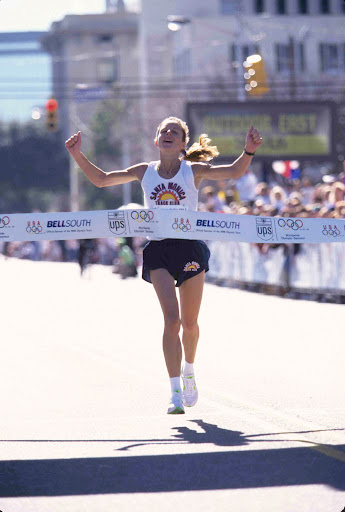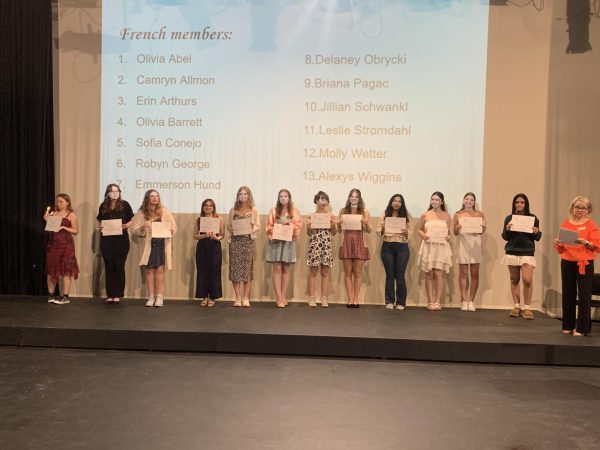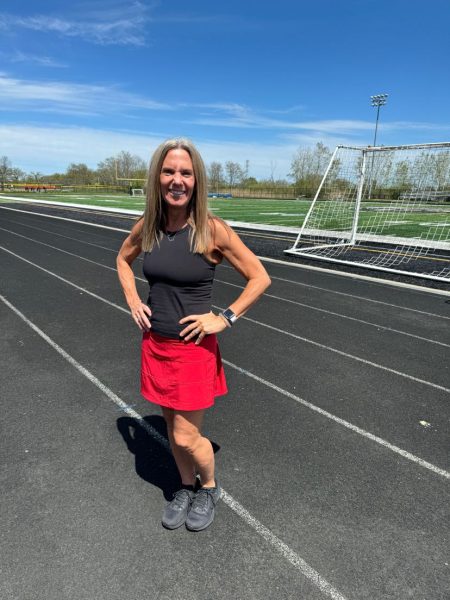Assistant coach shares her Olympic journey

Photo By Jenny Spangler
For most sports, professional athletes usually start playing as early as six years old and start training more intensively by 13 to 15 years old. Unlike most of these professional athletes, Jenny Spangler, a former professional runner and both cross country and track assistant coach, didn’t start until high school.
“I started running in high school when I was a freshman, and I started because my parents encouraged me to do extracurricular activities. I went out for basketball, and I got cut, so I was like ‘I’m going to try running’,” Spangler said.
Spangler’s passion for running grew the longer she was a part of the cross country team and found out that the more she ran, the more she enjoyed it. At the time Spangler was competing in high school, there was not much knowledge on how to properly prepare for a run. This lack of knowledge on nutrition can really mess up not only one’s race, but also might cause future injuries.
“When I first started running the races, I didn’t really know what I was doing, so like the night before and the morning of I ate too much. Back then, this was like the late 1970s, we didn’t really know much about hydration and nutrition. I ate all the wrong things, and I never stretched. As I got more serious, I started to talk to more people, and they taught me the importance of all those extra things. That’s what really improved my running,” she said.
Even though Spangler started running and taking it more seriously at a later part of life than most athletes, she was able to greatly improve in both cross country and track. She was able to make it to State for both cross country and track to represent Guilford High School in Rockford, Illinois. This improvement gave her more options to run in the future in college and professionally.
“I probably started taking it more seriously by my senior year of high school. You know I really fell in love with it and I was doing well. My senior year I was second in the state for cross country, Illinois, and fifth in 3200 in the state track meet. I was recruited by colleges, and I ended up going to the University of Iowa on an athletic scholarship,” she said.
After her running career in college, Spangler competed in the 1996 Olympic trials to represent the United States in Atlanta, Georgia. Spangler’s running career and training proved her to be a great runner, but it was seen as a surprise with how well she did in the race. Spangler was ranked 61st out of all the runners but proved to be the best when she came out on top.
“Well early on when I first started marathoning, I had some good races, but I had a lot of injuries, and so by the time 1996 came around, I hadn’t been doing a lot of racing, but I had been training really hard. So when I went into the trials, I was ranked 61st and the top three fastest times made it, so no one really gave me a chance. But I had been training out in California and had some good runs, and my coach told me ‘Jenny you’re in shape to do a really fast marathon. I don’t know if it’s going to get you in the top three or not’,” Spangler said.
Spangler, 33 at the time of the 1996 Olympic trials, won with a time of 2:29:54 seconds on that day in February. Even though all of her training prepared her to run a fast race, she was still not feeling the best on the starting line. Instead, Spangler ran the marathon just trying to do her best with no concrete pace in mind and ended up taking home first and solidifying her place in the 1996 Olympics.
“When I lined up that day, I did not think I was going to be in the top three. It wasn’t until later stages of the race that I started to believe I could really make the team. Marathons are all about patience, so at the beginning it’s all about patience because it’s easy to get caught up in your mind with all the excitement. It’s all about the last 10k in the marathon. That is usually when the real struggles happen. It’s kind of like mind over fitness at that point. I was trying to go over all the training and workouts I had done, so I knew that I could do it,” Spangler said.
Spangler only ended up competing for 7 miles in the 1996 Olympics because of an Achilles injury. The process for healing included surgery and time away from running so she could fully heal and come back to compete.
“Right when I started the race, my Achilles were really hurting me and the Atlanta course is really hilly, so a lot of times for Achilles injuries, it’s the hills that really get to it. So as soon as we got to the hills, by mile 7 my Achilles was hurting so bad that I had to stop. So I ended up having surgery after that. I participated in the 2004 Olympic trials and did pretty well,” Spangler said.
Spangler still wants to compete in more races, but she’s more focused on coaching the high school and her own separate club. She was able to take her love of long-distance running and use it to help other people who also enjoy it like she does. She gets a lot of enjoyment seeing both the students and adults that she coaches improve in running and have fun doing it.
“I really got into coaching after the 2004 Olympic trials, so I coached at both the high school level and adult level and found out that was kind of my passion. So that right now takes precedence over my own training. I love to run, so right now I run for enjoyment and whenever I can I get in a few miles. I get that itch to get back to competing again, so that depends on how my body holds up. Pounding out so many miles week after week, you know 100 to 120 miles each week, just kind of tore my body down. I love it. It will always be in my life. I just don’t know at what level,” Spangler said.
Jenny’s daughter, Grayslake North alumna and former cross country and track runner Kelli Tosic, takes after her mom in her love of running. In her running career at Grayslake North, Tosic competed at State for both cross country and track for long-distance events. Tosic even runs for the University of Iowa cross country and track teams.
“It’s so fun for me, especially because she is competing at my school that I ran for. I get nervous for her, but I also get excited. It really brings me great joy to watch her compete, mainly because she’s really enjoying it and having fun with it. I never want to put any pressure on her. For me, running is a lifelong sport. All you need is a pair of running shoes and you can go out the door at any time. There are people I coach in their 70s that are still running and even ran the Chicago marathon last weekend, so it really is a lifelong sport. Everyone that I coach, even Kelli, I want them to have that in their life, so it’s important to have fun,” Spangler said.




